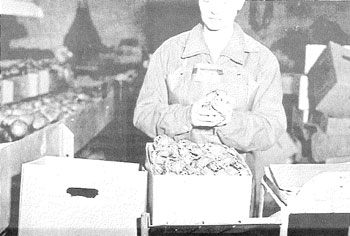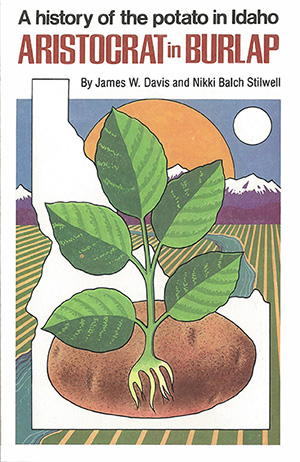 Fancy gift packs call for foil wrapping.
Fancy gift packs call for foil wrapping.
A new spirit of working together was born in the shipping industry, which performed the marketing function, and a general feeling developed that grading standards must be stricter and Idaho must deliver the superior quality potatoes that its advertising messages promised the American housewife.
Through the trying days of World War II, the Idaho® potato industry kept on marketing its products. The shippers had the problem of government priority diverting a substantial portion of the crop into processing channels for military needs. Fresh potatoes for the army and navy were also packed in Idaho in wooden crates-a new and different package for shippers to deal with. What potatoes were available to be shipped fresh were sold readily, and the Advertising Commission adapted the sales message to wartime conditions.
During the '40s, another change took place in the Idaho shipping industry. Shippers found supplies more difficult to get and their relationships with customers growing stronger. To enable them to supply regular accounts, many of the shippers also got into the growing business. During this period, the grower-shipper concept grew from the exception to the common practice. This enabled shippers to provide a more-dependable supply of potatoes to their customers since they could ship their own crop when they were not able to buy supplies from growers.
The late '40s saw an upgrading of merchandising practices and the advent of washing potatoes before packing them in Idaho. Once the American housewife had experienced the convenience of buying potatoes in the store from which the field dirt had been removed, she made her preference for washing known. Even though the washing process revealed defects that could not be easily detected in a dry pack and showed some other disadvantages in keeping qualities and shelf life, the practice became virtually universal in the industry.
During this period, shippers also began supplying consumer-size units. The market share of national supermarket chains was growing, and the traditional broker-jobber sequence in the market was being bypassed. Chains that were able to buy straight cars of potatoes to be unloaded at their own warehouses, however, preferred consumer-size bags that did not need repacking before they could be put on display in stores. Such giant merchandising organizations as Kroger and A&P actually had their own resident buying organizations in Idaho.


 Fancy gift packs call for foil wrapping.
Fancy gift packs call for foil wrapping.